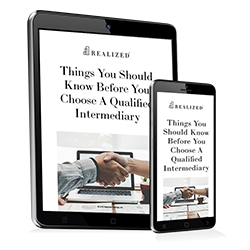Page 3 21 - 30 of 37
Qualified Intermediary Installment Sale: What You Need to Know

If you have been paying attention to previous Realized blogs, you know that we’ve written a great deal about Qualified Intermediaries (QIs) and their importance to successful 1031 exchanges. Without help from that experienced QI, the like-kind exchange could be derailed, and you could face triggered capital gain taxes.
Is a 1031 Exchange Broker a Qualified Intermediary?

There is little doubt that the successful execution of a 1031 exchange involves a lot of moving parts. There are the various IRS deadlines, not to mention the rules and regulations involved with exchanging one like-kind property into another in an effort to defer capital gains taxes.
What Is the Difference Between a Qualified Intermediary and FATCA?

A Qualified Intermediary or QI is a key participant in a 1031 exchange and is critical to the successful outcome of the transaction. Sometimes referred to as a 1031 Exchange Accommodator, the QI is responsible for the following actions:
Qualified Intermediary Withholding: Everything You Need to Know About QI Agreements, Statements & Foreign Partnerships

Mention the words “Qualified Intermediary” and the next thing that might come to mind is “1031 exchange.” Certainly, QIs are essential when it comes to the successful execution of a real estate like-kind exchange. In this case, the entity, also known as the accommodator, acts to change a sale to a buyer and a purchase from a seller into an exchange of the one for the other. In addition, the QI prevents the taxpayer from being considered in actual or constructive receipt of the proceeds during the interim period between the sale and purchase.
What Are Qualified Intermediary Regulations, Responsibilities, and Obligations?

We discuss the topic of qualified intermediaries frequently at Realized Holdings, and for very good reason. The QI (also known as a facilitator or accommodator) can mean the difference between a successful 1031 exchange, and one that might fail and be challenged by the IRS. A reputable, experienced qualified intermediary must follow certain regulations, responsibilities, and obligations. To understand the activities of this entity requires an understanding of why it’s involved, in the first place.
Can a Bank be a Qualified Intermediary?

An essential part of the 1031 exchange is the inclusion of a qualified intermediary, or QI. That QI could be considered the cornerstone of a successful exchange; its job is to hold proceeds from the sale of the relinquished property, until closing on the replacement property. If you are the exchanger in the process, your QI ensures you never touch those funds.
What is a Non-Qualified Intermediary?

Anyone embarking on the 1031 exchange process understands that an independent entity, responsible for facilitating transfer of the proceeds, is necessary to ensure a successful property swap. Known as the Qualified Intermediary (QI) or sometimes, accommodator, this entity takes control of the funds, from the moment the relinquished property is sold, until the purchase of the replacement property.
Does a 1031 Qualified Intermediary Have to Reside in the Same State Where the Original Property Was Sold?

For an investor engaged in a 1031 exchange transaction, the Qualified Intermediary's correct utilization is one of the key elements to success. The Qualified Intermediary, sometimes referred to as a 1031 exchange accommodator, is an independent entity that facilitates the transfer of proceeds from the sale of the relinquished property into a holding account and from the holding account to the purchase of the replacement property. This intervention is essential to avoid the taxpayer having control over the funds between the sale of the original property and purchase of the replacement.
How to Properly Vet a Qualified Intermediary

For a taxpayer seeking to defer recognition of capital gains by completing a 1031 exchange, one of the key determinants of success is often in the selection of the Qualified Intermediary (QI) used to facilitate the transactions. The reason for the importance of this role is the crucial tasks for which the QI is responsible. Mistakes by a Qualified Intermediary can result in the IRS disallowing the deferral.
Industry Trends for Qualified Intermediaries to Consider as Filing Deadline Approaches

As we approach the July 15, 2020, Internal Revenue Services filing deadline amidst the global pandemic, our team at Realized wanted to share some thoughts and statistics that we are seeing in the market. Our goal with this data is to help Qualified Intermediaries (QIs) and their clients better navigate the next three weeks leading up to the deadline.
Page 3 21 - 30 of 37


